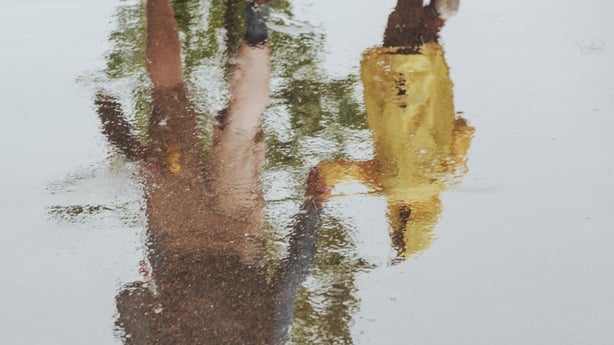Around 230,000 children are currently estimated to experience material deprivation, according to the Economic and Social Research Institute (ESRI).
Material deprivation is a direct measure of poverty derived from the lack of items and activities deemed to be necessary for an acceptable standard of living.
The ESRI has found that the share of individuals in households unable to afford two or more items from a list of ten essentials rose from just over 17% in 2022 to 20% in 2023 for those under 18.
The list includes two pairs of strong shoes; A warm waterproof overcoat; New (not second-hand) clothes; Replacement of worn-out furniture; A meal with meat, chicken, fish (or vegetarian equivalent) every second day; or a roast joint or its equivalent once a week.
It also includes home heating during the last year; Presents for family or friends at least once a year; Drinks or a meal for family or friends once a month, a morning, afternoon or evening of entertainment once a fortnight.

In contrast, material deprivation fell over the same period from just over 11% to almost 10% for those aged over 65.
This group also saw their average real disposable incomes rise by 3%, boosted by a rise in income from work and higher employment rates.
The research showed that after a decade of uninterrupted growth, inflation has left average disposable income lower than it was two years earlier across the population as a whole.
The report said those experiencing low income or material deprivation are less engaged in civic participation.
We need your consent to load this rte-player contentWe use rte-player to manage extra content that can set cookies on your device and collect data about your activity. Please review their details and accept them to load the content.Manage Preferences
They are also less likely to have been involved in formal and informal volunteering or to have taken part in any political activity in the last 12 months.
The study found that the pandemic had a damaging effect on life satisfaction, civic participation, and social contact.
By 2023, life satisfaction had still not recovered to pre-pandemic levels recorded in 2018 and civic participation in 2022 was half the level in 2015.
Research Professor at the ESRI and co-author of the report Dr Helen Russell stressed the importance of supporting the social infrastructure of disadvantaged communities.
Dr Barra Roantree who co-authored the report with Dr Russell said a second tier of child benefit targeted at low-income families may need to be considered "if Government commitments to reduce rates of child poverty and material deprivation are to be achieved".
We need your consent to load this rte-player contentWe use rte-player to manage extra content that can set cookies on your device and collect data about your activity. Please review their details and accept them to load the content.Manage Preferences
Cost-of-living package to come in October - Taoiseach
Speaking in relation to the report, Taoiseach Simon Harris said the Government needs to take "further action in relation to supporting children and supporting families".
"It's why there is a need for a cost-of-living package, and it's absolutely why there is going to be a need to have targeted measures in the budget," said Mr Harris.
Mr Harris said a cost-of-living package will be announced on 1 October, and introduced between then and the end of the year.
Ireland, the Taoiseach said, was a "wealthy, successful country" and said that "we can do better when it comes to this area, and I'm absolutely determined that we will".
The Minister for Children has responded to calls for targeted supports for children following the ESRI report on child poverty.
Speaking at the launch of the Water Action Plan in Thomastown in Co Kilkenny, Roderic O' Gorman said: "The approach I've adopted in my department over four years has been a mix.
"We've had universal cuts in childcare costs, but we've also had targeted measures in terms of equal start, in terms of aim, the access inclusion model for children with a disability, to give them extra supports and in terms of the NCS sponsored program."
Mr O’Gorman said he "very much" believes in "a mix of universal and targeted measures".
Responding to the publication of the ESRI report, Sinn Féin spokesperson on Social Protection Donnachadh Ó Laoghaire said it was very concerning to see such an increase in child poverty.
He said: "This report is yet another wake-up call for the Government. For all their big talk and announcements on tackling poverty, the fact is that there are more children in material deprivation now than 12 months previously. It is a clear sign action is needed on tackling poverty."
Families facing 'very stark choices'
The Community Foundation of Ireland supported the research.
Chief Executive Denise Charlton said the challenges identified in the report reflected the reality many face on the ground every day, and said it highlighted the importance of policy decisions which promote inclusion and equality for all.
Speaking on RTÉ's Morning Ireland, Ms Charlton described the choices facing families living below the poverty line as "very stark" and called for a second-tier child benefit to be introduced for those families in need.
"We have children who are going hungry, who don't have clothes to wear. Their parents are worried about heating their house."
CEO of the Children's Rights Alliance Tanya Ward said the figure of 230,000 children experiencing material deprivation did not surprise her.
She said it was down to the cost-of-living crisis, whre many household incomes are being eaten by housing costs, leading parents to having to make difficult choices.
Ms Ward told RTÉ's Drivetime: "It's stressful and over a long period of time, it affects your mental health and this is noticed by children."
She added that children even at a young age do not want to put pressure on their families so will not ask for the things they need.







